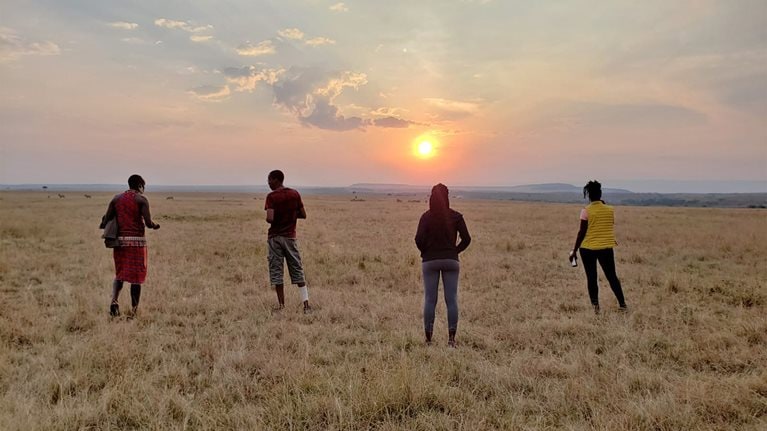The pandemic has disproportionately affected women. In our Women in the Workplace research last year 1 in 4 of them told us they were considering taking a step back in their careers or leaving the workforce entirely. A year after WHO declared COVID-19 a global pandemic, we’re talking to several McKinsey women about how they’ve made it work over the last year—the surprising challenges, unexpected joys, and how the last 12 months have shaped their outlook on life and work. This week, Amandla Ooko-Ombaka, an associate partner based in Nairobi, talks about managing teams and a long-distance relationship during the lockdown and how a commitment to early-morning workouts has made all the difference to her well-being and health.
On the exact moment when the crisis became real
I love food, so I do all my work in agriculture and food—everything across the value chain from working with governments that are helping farmers be more productive and earn a dignified living, all the way to supporting fast-food restaurants and grocery stores, where consumers like you and me buy food. I believe strongly in the power of agriculture and food to transform Africa, so last February, I went to Boston for the Harvard Africa Business Conference to speak on a panel on these very topics. My partner, who lives in Seattle, met me and said, “Look, Amandla, do you want to go back with some masks? This crisis is just starting to emerge.” There were about eight cases in Boston at the time. I was like, “No way; we totally have masks and PPE in Kenya. We’ll be fine.”
A month later, when we had our first COVID-19 case in Kenya, is when I think it really hit me. Even as I saw the shutdowns across Europe and the U.S., I initially thought there was no way that the outbreak was going to affect what was going on here. But then we started pulling teams off projects, including a team in Ghana that needed to be in markets interacting with distributors and vendors every day. That’s when I thought, “Yup, this is probably going to last much longer than I had originally anticipated.” At that moment, I knew it wasn’t just going to change our lives personally or how we at the firm work, but it was going to change how our clients really thought about the next year.
On finding unexpected joys in a challenging year
I bought a new mattress. I hadn’t spent that much time in my bed over the past four years. I actually got a call from the ministry. They mentioned I’d not been in Kenya for more than two consecutive weeks the year before, so they were asking what business I was doing here.
But it’s been a really pleasant shift. Now that I’m working from home, I know all the grocery delivery people. I know the timing of everything that happens in my neighborhood. If you need some gossip in my neighborhood, I am your gal, which is a very different life experience than before the pandemic when I was traveling so much. It’s allowed me to focus on my health. My brain wakes up at 10:00 a.m. But I am in the gym by 5:30 or 6:30 every morning. No matter what happens the rest of the day, by 7:00 a.m., I’ve accomplished one thing—and no one can take that away from me.

On navigating the disruption caused by the pandemic
Because I have teams in five different time zones, it means I’m sometimes up at 5:00 a.m. for calls, and other times I’m up at midnight to support them. I’m in a long-distance relationship, and that works really nicely when you can travel. It’s terrible when you can’t travel. He’s more than 9,000 miles away from Nairobi. We talk twice a day. Just saying good night or good morning and hearing how each other’s days were has been quite important.
But I’m very lucky because I still have a job. I’ve had zero concern about my job security this entire period of the crisis. I’ve never worried about what I’m going to eat and have been fortunate not to have had any personal health concerns. And, you know, if something were to go wrong, I fully trust and believe in the firm’s systems and protocols. So despite my tough times being bad for me, I’m just very conscious of other people who have it infinitely worse—those who aren’t sure if they are going to make it through the next week, let alone the next year.
On the lessons she’ll take forward from the last year
One of the things I’ve taken advantage of, and I wish I’d done it earlier, is Mind Matters, a mental health offering at the firm. I didn’t realize how much stress the pandemic had put on me until one of our HR managers told me, “Amandla, you need to talk to someone.” And I was like, “I don’t need to talk to anybody. I’m fine.” I was not fine.
But the pandemic has changed my life in so many ways. I’ve been part of so many incredible conversations about the impact of COVID-19 on the continent. I don’t know what's going to stay here in this new normal. What I do know is: My head sits on top of my body, right? So I need to take care of my body. I need to sleep. I need to eat. I need to work out. All those things are important whether I’m at McKinsey or not. So making sure I take care of myself and taking it back to basics is really important in this next phase of life.